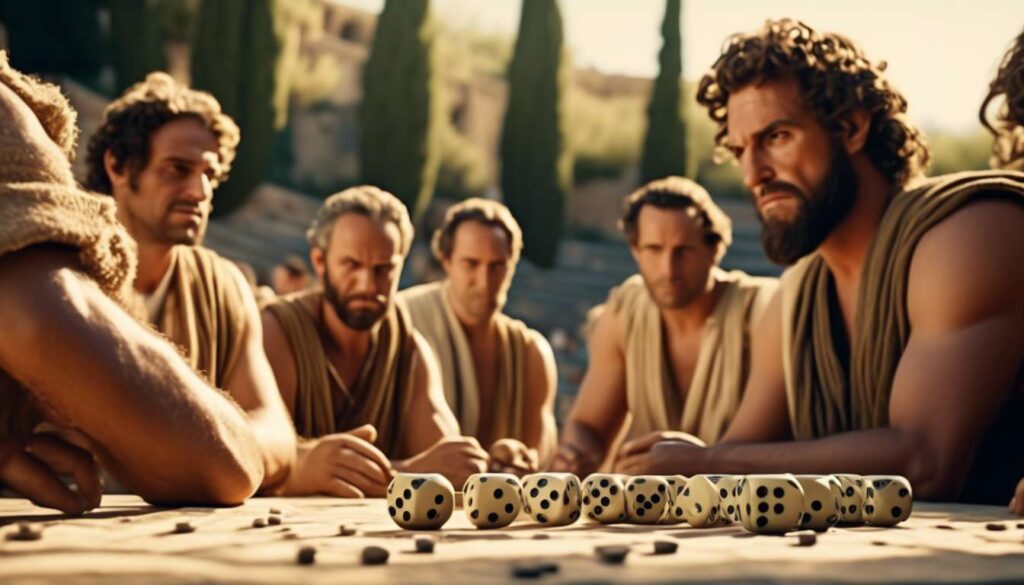As we delve into the fascinating world of sports betting, we find ourselves intrigued by its origins and evolution. Our collective curiosity drives us to explore how this multifaceted phenomenon began, transforming from casual wagers among friends to a global industry.
Together, we unravel the rich tapestry of history, tracing back to ancient civilizations where betting on athletic contests first captured the human imagination. We journey through time, witnessing the rise of organized sports and the subsequent emergence of structured betting systems.
Along the way, we discover how cultural, economic, and technological shifts have shaped the way we engage with sports betting today. Our exploration not only highlights the significant milestones in its development but also invites us to ponder the societal impacts and ethical considerations that accompany this popular pastime.
As we embark on this journey, we aim to understand the roots of sports betting and its enduring appeal.
Origins in Ancient Civilizations
Sports betting dates back to ancient civilizations where it was a prevalent form of entertainment and social interaction. As members of these early societies, we can imagine gathering around, feeling the excitement in the air as wagers were placed on various sporting events.
Ancient civilizations, from the Greeks to the Romans, weren’t just laying the groundwork for philosophy and governance; they were also pioneers in the world of wagering. Betting wasn’t just about the thrill of victory or defeat; it was a way to connect with one another and to feel part of a larger community. We can sense the camaraderie and shared enthusiasm that such events must have fostered.
Although technological advancements were far from our minds, the essential human desire to belong and compete was already at play.
As we look back, we see that our modern fascination with sports betting is rooted in these age-old practices, linking us to our ancestors in a shared tradition of chance and community.
Early Forms of Wagering
Across various cultures, early forms of wagering involved placing bets on athletic contests, animal races, and even gladiatorial battles.
In ancient civilizations like Greece and Rome, these bets weren’t just about money; they were a communal experience, bringing people together in shared excitement and anticipation. We can imagine the bustling arenas filled with spectators, all part of a larger community united by the thrill of wagering.
In different parts of the world, various forms of betting took hold:
- In Egypt, chariot races were popular.
- The Chinese bet on animal fights.
These traditions laid the groundwork for the sports betting culture we know today.
As societies evolved, so did our methods of betting. Technological advancements, even in those times, played a role in spreading wagering practices across different regions. By adopting new tools and systems, ancient communities were able to expand their betting activities and connect with one another.
Through wagering, we found a way to:
- Bond with others.
- Celebrate victories.
- Endure losses.
These activities created shared memories that transcended generations.
Evolution of Betting Practices
Throughout history, we’ve witnessed the transformation of betting practices as societies adapted to new technologies and cultural shifts.
In Ancient Civilizations, wagering was a communal activity often tied to cultural rituals and social gatherings. These early forms of betting were simple, yet they fostered a sense of belonging and community among participants, creating bonds that transcended daily life.
As we moved through the ages, technological advancements began reshaping how we placed wagers:
- The invention of the printing press allowed for the spread of betting information.
- The telegraph and telephone revolutionized real-time communication, making it easier for us to engage in wagering across distances.
These innovations brought a new level of excitement and accessibility to betting, broadening our community and connecting us in ways our ancestors could never have imagined.
Today, we continue to embrace technological advancements by integrating digital platforms and mobile apps into our betting practices. This evolution not only enhances our experience but also strengthens our global connections.
Role of Organized Sports
Organized sports have played a crucial role in shaping the modern landscape of betting by providing structured opportunities for wagers and fostering a widespread culture of competitive excitement. From ancient civilizations, where people gathered to watch athletic contests, wagering became a social activity, connecting communities through shared enthusiasm and stakes. This spirit of camaraderie and competition continues to thrive.
In ancient civilizations like Greece and Rome:
- Organized sports events offered fertile ground for wagering.
- These early gatherings laid the foundations for our modern sports culture.
- They brought people together and created a sense of unity.
Fast forward to today, technological advancements have transformed the way we engage with sports and betting. We’ve embraced innovations that allow us to:
- Connect with events across the globe.
- Broaden our horizons.
- Enhance our shared experiences.
As part of this vibrant history, we find ourselves united by a timeless passion for sports and the thrill of the wager.
Emergence of Betting Systems
Betting Systems Evolution
Betting systems have evolved over the centuries, enabling us to strategize and enhance our chances of success in the world of sports wagering. From the early days of Ancient Civilizations, people sought ways to predict outcomes and increase their winning odds.
- We imagine ourselves gathered with others, sharing insights, and feeling connected as we place our bets on gladiator games or chariot races.
- These communal experiences laid the groundwork for the first informal systems of wagering.
Technological Advancements
Fast forward to today, and we find ourselves in a world transformed by technological advancements. We’ve moved from rudimentary methods to sophisticated algorithms and online platforms, making betting more accessible and precise.
- These tools allow us to analyze vast amounts of data, giving us a sense of belonging in a global community of bettors.
- As we share tips and strategies, we feel the thrill of being part of a collective journey, continually refining our approach to sports betting.
Influence of Cultural Shifts
Cultural shifts have profoundly reshaped our approach to sports betting, influencing not only who participates but also how and why we engage in this age-old pastime. From the days of Ancient Civilizations, where wagering was a communal activity, to our modern context, cultural dynamics have played a key role.
We’ve transitioned from small, tight-knit groups of bettors to a global community, thanks to these shifts. Technological advancements have further bridged our cultural gaps, allowing us to connect and wager from anywhere in the world.
As we embrace these changes, we find comfort in knowing that we’re part of a larger community that shares our passion. The reasons we bet have evolved too; it’s no longer just about the thrill but also about participating in a shared cultural experience.
Our collective history in wagering binds us, and these cultural transformations ensure that sports betting continues to thrive, adapting to our modern world while honoring its rich past.
Impact of Economic Factors
Economic Factors and Sports Betting
Economic factors play a crucial role in shaping the landscape of sports betting, influencing how much we wager and the risks we’re willing to take. Throughout history, from Ancient Civilizations to modern societies, our financial environment has impacted our betting habits.
Impact of Economic Conditions on Betting Habits
- In prosperous times, we’re inclined to place larger wagers, feeling secure in our financial standing.
- Conversely, during economic downturns, we might become more cautious, perhaps reminiscing about the shared experiences of past generations who faced similar challenges.
Historical Context: Ancient Civilizations
In Ancient Civilizations, wagering was not only a form of entertainment but also a reflection of economic status. The wealthier members of society often engaged in betting, creating a sense of community and belonging among peers.
Modern Dynamics: Technological and Economic Influences
Today, as we navigate the complexities of the global economy, our betting strategies continue to evolve.
- Technological Advancements: These have undeniably altered how we participate in sports betting.
- Economic Realities: Our decisions remain deeply rooted in the economic realities we collectively face and adapt to.
This relationship between economic conditions and sports betting highlights the enduring connection between financial security and recreational risk-taking.
Technological Advancements in Betting
In recent years, we’ve witnessed remarkable technological innovations that have transformed the sports betting landscape. We’ve come a long way since the days of Ancient Civilizations, where wagering was a communal activity that brought people together in shared excitement and risk. Today, technology connects us in ways our ancestors couldn’t have imagined, creating a global community of sports enthusiasts who engage in wagering with just a few clicks.
The rise of online platforms and mobile apps has made betting more accessible and convenient, allowing us to:
- Place wagers from the comfort of our homes
- Bet on the go
These technological advancements ensure that we’re always part of the action, regardless of location.
Live betting features and real-time data analytics empower us by offering:
- Insights that enhance our wagering experience
- Odds that are constantly updated to reflect the latest developments
As members of this vibrant community, we embrace these innovations, which continue to enrich our connection to sports and each other, just as it was in those ancient times.
Conclusion
In conclusion, sports betting has a rich history that dates back to ancient civilizations. From early forms of wagering to the influence of organized sports and cultural shifts, betting practices have evolved significantly.
Today, technological advancements have further revolutionized the way people engage in sports betting.
The impact of economic factors continues to shape the industry, making it a dynamic and ever-changing aspect of the sports world.

